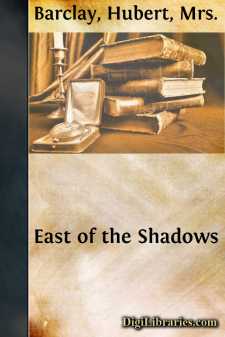Categories
- Antiques & Collectibles 13
- Architecture 36
- Art 48
- Bibles 22
- Biography & Autobiography 813
- Body, Mind & Spirit 142
- Business & Economics 28
- Children's Books 15
- Children's Fiction 12
- Computers 4
- Cooking 94
- Crafts & Hobbies 4
- Drama 346
- Education 46
- Family & Relationships 57
- Fiction 11828
- Games 19
- Gardening 17
- Health & Fitness 34
- History 1377
- House & Home 1
- Humor 147
- Juvenile Fiction 1873
- Juvenile Nonfiction 202
- Language Arts & Disciplines 88
- Law 16
- Literary Collections 686
- Literary Criticism 179
- Mathematics 13
- Medical 41
- Music 40
- Nature 179
- Non-Classifiable 1768
- Performing Arts 7
- Periodicals 1453
- Philosophy 64
- Photography 2
- Poetry 896
- Political Science 203
- Psychology 42
- Reference 154
- Religion 513
- Science 126
- Self-Help 84
- Social Science 81
- Sports & Recreation 34
- Study Aids 3
- Technology & Engineering 59
- Transportation 23
- Travel 463
- True Crime 29
East of the Shadows
by: Hubert Barclay
Description:
Excerpt
"PHILIPPA"
"Her air, her manners, all who saw admired,
Courteous though coy, and gentle, though retired:
The joy of youth and health her eyes displayed,
And ease of heart her every look conveyed."—CRABBE.
The porter slammed the door with all the unnecessary vehemence usual to his class and touched his hat, a shrill whistle sounded, the great engine gave several vehement not to say petulant snorts, and the long train glided slowly out of the terminus. Gaining speed with every second, it whirled along through the maze of buildings which form the ramparts of London—on past rows of dingy backyards where stunted bushes show no brighter colour than that of the family washing which they support every week—on through the suburbs where the backyards give place to gardens trim or otherwise, and beds of gay flowers supplant the variegated garments—on until at last it reached the open country, spreading fields and shady woodlands, where it seemed to settle to a steady pace that threw the miles behind it, as it rushed forward with mighty throb and roar.
Philippa Harford breathed a sigh of relief at finding herself alone in her compartment, and arranging her belongings round her with the method of an experienced traveller, she settled herself in a corner seat and took up her book. She did not read for long, however, for in a few moments her eyes wandered to the window and there fixed themselves on the swiftly passing landscape. She let her hands fall into her lap and sat thinking.
Some of her friends (or perhaps acquaintance would be the truer word) had been known to describe Philippa Harford as an "odd girl," and if this indefinite adjective meant that she was somewhat different from the majority of young women of her generation, there was truth in the description. For while freedom of action and of speech are notably characteristic of the young of the present day, there was about her a reserve, one might almost say a dignity, beyond her years. Where the modern girl will cheerfully collect friends haphazard by the roadside, Philippa allowed very few to pass the line which divides the stream of acquaintanceship from the deep waters of friendship.
There are, and always will be, some people who display to the world a formidable aspect, as it were a stone wall with a bristling row of broken bottles on the top, or an ugly notice board with injunctions, such as "Strictly Private," or "Keep off the Grass," but Philippa was not one of these. You might wander in her company along paths of pleasant conversation, through a garden where bloomed bright flowers of intelligence and humour, and it was only afterwards that you realised what in the enjoyment of the moment you had failed to notice, namely, that inside the garden a high hedge, which had appeared merely a pleasing background for the flowers, had completely hidden the part you most particularly wished to see, and that the paths had brought you out at the exact spot where you entered.
It was just because this hedge of gentle reticence denied to a curious mob admission to the inner sanctuary of her thoughts, that they designated her as "odd." They found it impossible to know just what she meant and felt and thought....


